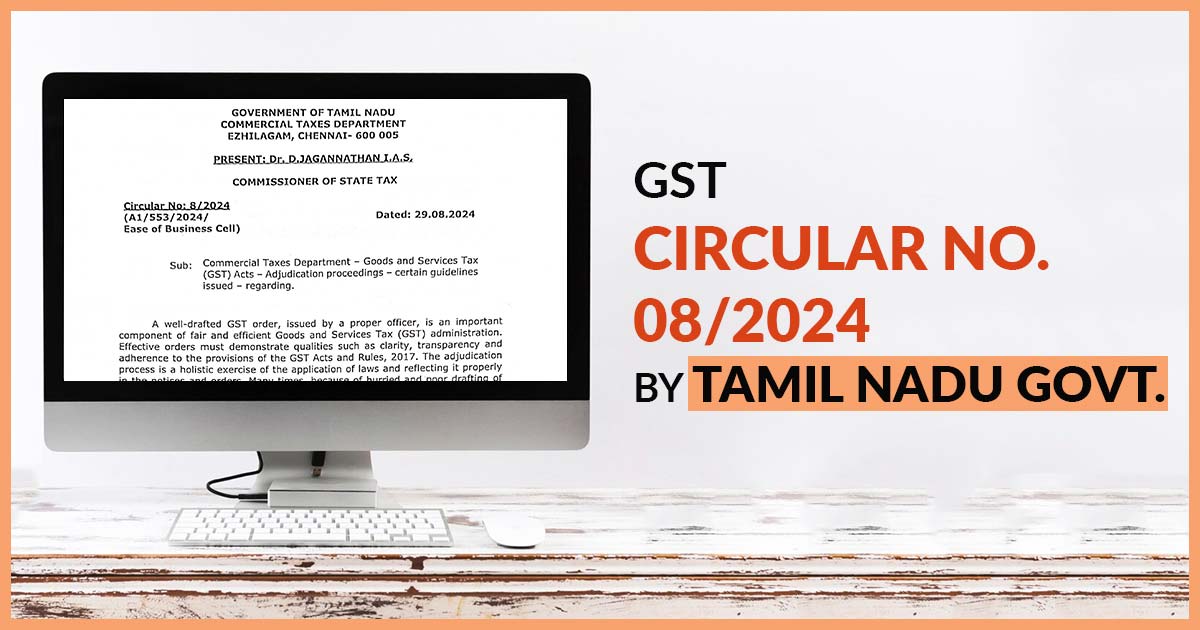
On August 29, 2024, the Tamil Nadu GST Department issued Circular No. 08/2024 furnishing the essential norms for the adjudication proceedings under the Goods and Services Tax (GST) along with the drafting of the GST notices, orders, personal hearing, etc. It said that the qualities and contents required for the order, the notices, and the whole proceedings.
It has been shown by the circular that the requirement for well-drafted orders via the proper officer stressed the significance of clarity, transparency, and compliance with the GST acts and rules of 2017. The objective of issuing the circular is to rectify the quality of GST orders, reduce litigation, and secure government revenue.
As per the circular, an effective Goods and Services Tax (GST) order should secure various qualities. The first is that clarity and conciseness are significant. The orders must be written in straightforward, unambiguous language that concentrates on the major reasoning behind the decision and prevents unnecessary explanation. The same cites that the assessees can simply learn the order and its implications.
Logical reasoning is an additional aspect; the judgment ought to present a logical justification for its outcome, accurately stating the facts of the case, citing pertinent legal regulations, and illustrating their application to the unique circumstances at hand.
The circular highlights the necessity of fairness, emphasizing that GST orders should be unbiased and reflect a dedication to fairness by thoroughly assessing evidence and strictly following legal norms.
It was also mentioned that adhering to legal precedents is essential, as it boosts the legitimacy of the decision and offers clarity to taxpayers, thereby fostering trust in the GST system.
When an order permits any remedies or reliefs, including refunds or adjustments, these must be clearly defined and accompanied by detailed descriptions. In the end, a carefully drafted GST order should strive for a fair and equitable resolution of all matters, safeguarding taxpayers’ rights and ensuring the order is enforceable.
Adjudicating authority role as defined by the Tamil Nadu GST Act of 2017, is to issue a “speaking order” after thoroughly assessing the case. This process must stick to the Principles of Natural Justice, which form the rule against bias, the right to a fair hearing, and the prerequisite for a reasoned decision. These principles ensure that the adjudication process is clear and just.
The circular indeed cited what must be comprised in a Show Cause Notice (SCN) which is the initiating point of the adjudication process. The notice furnishes a brief start to the taxable person and their business, particularly the question period, and cites the legal provisions under which the notice is to be issued. It must indeed list the proof laid on via the adjudicating authority. It cites that the notice should mention the problems at hand, the offered measure, and the rights of the assessees along with the right to a personal hearing.
The circular also quoted that before issuing a final order the proper officers are suggested to ensure that all sorts of natural justice have been addressed. The same comprises pertinent documents to the taxpayer, permitting cross-examination and thoroughly analyzing the taxpayer’s objections.
Read Also: Karnataka HC Orders Verification of GST Documents Not Submitted Due to Noticee’s Hospitalization
The final order must be carefully drafted, ensuring that all issues are logically addressed and easily understandable. It should also clearly state the tax liability, including any applicable interest and penalties, and notify the assessee of their privilege to appeal, as composed in the circular.
The circular outlines a model sequence for drafting GST orders. It emphasizes the importance of a structured and chronological approach, which involves referencing pertinent documents, summarizing the taxpayer’s reply, and furnishing a detailed discussion of the issues. The order must be comprehensive yet concise, avoiding excessive legal jargon and concentrating on the facts and evidence of the matter.









